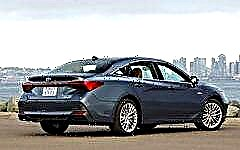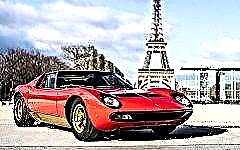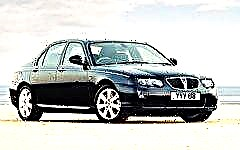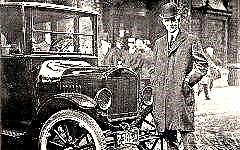

The content of the article:
- First optimizer
- Champion of discipline
- First driving license
- Past lives
- World War I pacifist
- Profit underfoot
- Commander of the Order of Merit of the German Eagle
- Ford and Edison
- "My Believer"
- Career method
People who have left their mark on history are always controversial. Researchers of other people's lives (whose names are often not remembered) often interpret the facts and offer the general public fictional biographies that do not give an idea of the person's character, addictions and real aspirations.
Henry Ford - his place in the history of the automotive industry can hardly be overestimated. Who was he to his contemporaries, who believed that it would take a hundred years to understand if he hurt or helped humanity? How did the son of a simple farmer manage to create an empire and become a hero of the nation? Why did his portrait hang in the office of Hitler, who admired the genius of Ford?
Biographers continue to search for and discover new facets of the personality of this great man. Here are some amazing facts from the life of Henry Ford, and let everyone draw their own conclusions.
1. First optimizer

Henry Ford owns 161 patents for an invention, and the lion's share of his developments are automatic machines and devices that simplified the work of ordinary craftsmen. There is an opinion that Ford can be considered the first who invented the conveyor assembly for automobiles and applied the installation in his workshops - disputes about this are still ongoing.
Ford was the first to put its mechanics on an 8-hour day and set the maximum wage in the United States at $ 6 an hour. In six months, 80% of all leading foremen and mechanical engineers worked at his factories.
Everyone could get a job at Ford factories: disabled people, blind and deaf, former criminals. Only one criterion was important - the desire to work and study. Deaf people worked in workshops with maximum noise levels, blind people were involved in assembling small parts.
"Trade unions are parasites, but not helpers of the worker" - this was the answer of an industrialist to all the trips to organize a trade union movement in his factories. Under the pressure of the political situation and the crisis of the 30s, trade union organizations were the last to appear in his automobile empire.
2. A champion of discipline

It was profitable and prestigious to work for Ford, but only if you are white. Henry's father had been in the Ku Klux Klan for a long time, and Ford did not hide his prejudices against blacks and anti-Semitic sentiments. Towards the end of his life, Ford stopped talking about this topic - many journalists thought that the tycoon had changed his position, but whether this was really so is unknown ...
Ford established a fixed wage for its workers, which was charged automatically - a light signaled this. If the light has gone out, it means that the conveyor has stopped and the accruals have stopped. In his factories, the conveyor almost never stopped, and if there were power outages, workers began to move it manually.
At Ford factories, there was a special service, whose employees were interested in the moral character of the workers, asked neighbors and acquaintances. In factories it was forbidden to smoke, drink at home and ... dance the depraved "Charleston". On the checkpoints were the inscriptions - "Remember, the Creator did not give a man spare parts."
3. First driving license

At the end of the 19th century, the authorities were faced with the question of how to regulate relations with the owners of the first cars that began to take to the streets of cities. In Europe, Karl Benz, the future founder of the Daimler Benz corporation, received the first driver's license.
In the United States, Henry Ford received the first license to drive a "self-propelled truck". The document was issued by the Detroit Police Chief under the patronage of the mayor of the city. And it was Ford who was the person who proposed in 1889 to issue the license to drive cars after passing the exams. In England, passing exams was introduced only in 1934.
4. Past lives

There is no exact data when Ford became interested in Hinduism and the philosophy of reincarnation. It is fairly well known that at the age of 26, Henry already firmly believed that this was not his first life.
He spoke unequivocally about his talent in his memoirs. Genius, he believed, is the experience of past lives, which helps a person in real incarnation. The belief that he would be able to realize all his plans, if not in this life, then in the next, gave him extraordinary optimism and energy.
In an interview with the San Francisco Examiner magazine in 1928, 65-year-old Ford talked about his vegetarian addictions and past incarnations. The tycoon knew that in his last past life he was a simple soldier who died in the Battle of Gettysburg in 1863 during the American Civil War.
Ford's house was open to Indian monks, with whom he talked and meditated for hours.
5. The pacifist of the First World War

After the outbreak of the First World War, the tycoon acquires a transatlantic liner and sails to Europe to personally carry out propaganda for an end to the war, donating millions of dollars in the process. His mission did not bring success - the war continued, and more and more states were drawn into it. But Ford returned to America as a hero.
And within a month, half of Ford's factories were redesigned for the production of tanks. America has strengthened its economic position in the world, and Ford has tripled its capital.
6. Profit underfoot

Ford had a phenomenal ability to make a profit out of everything. Raising workers' wages by 10% increased his income by 400%, and after the publication of a letter from a local gangster that a Ford car is the most reliable car of high quality, and henceforth it will only steal this model, the entrepreneur's capital doubled.
The main advertising event of that time can be considered a photo in newspapers, where they captured the shot car of gangsters Clyde and Bonnie. The steel doors of the "Sandy Desert" Ford V8 car perfectly protected the raiders during the shootout with the police. Photos spread around the world, and sales of Ford cars began to creep up again.
In 1917, Ford sent out about a thousand of his agents to repair shops and junkyards to test in practice which parts of his T-car break down the fastest and most often. A month later, a report was ready - everything breaks down except for the central axis of the front axle. The tycoon gave the order to use a different metal for the part in order to downgrade its quality.
7. Commander of the Order of Merit of the German Eagle

Ford and Hitler sympathized with each other. This was facilitated by Ford's anti-Semitic views. His newspaper had a narrowly focused specifics and often reflected the opinion of the Fuhrer.
In 1930, Ford officially retired and became a private person, in 1938 the German government solemnly awards Ford with the Order of the German Eagle, or the Iron Cross, one of the main insignia of Germany in those years. The Iron Cross was a party order of the NSDAP and was awarded to foreign citizens as a sign of affection for the Fuhrer's regime. The first Knight of the Order was Benito Mussolini.
A meticulous analysis of historians has shown that the Ford Corporation's contribution to the financing of the Nazi regime was significantly less than that of other American private and public companies.
Henry Ford invested in the German economy since 1918, long before the Nazis came to power, while General Motors invested in German industry through neutral states until 1943, and Union Banking, where the grandfather and father of future American presidents, Bush Prescott, worked. financed the top of the Third Reich until 1942.
8. Ford and Edison

In the photo: Henry Ford and Thomas Edison
The young Ford's first place of work was the Edison Electric Company. The inventors were convinced that in the future, cars would only use electric motors and that they would run on rechargeable batteries. The problem was that the batteries were bulky and couldn't hold a charge long enough.
After spending several decades researching, Ford settled on gasoline as the cheapest fuel, but attempts to invent a battery with a long life continued.
It was the increase in the number of cars that sparked the oil boom in America and allowed oil companies like Standard Oil to become market monopolies.
9. "My Believer"

In the photo: Henry Ford and his wife Clara
Henry Ford loved the only woman all his life - his wife Clara, who had an amazing talent - to trust her husband and always be on his side. In his declining years, Ford said that she was his only happiness, which never left him, even when he fell in love with 17-year-old secretary Evangeline in 1909.
The affair with Evangelina ended very quickly - Ford married the girl off, gave her a luxurious mansion with a personal airfield, left a millionth bank account. But some researchers argue that the affair with Evangeline continued after the secretary's marriage, and that in 1928 she gave birth to a son to Ford.
"Women are a lot of fun and tons of problems" - Ford's phrase became winged. After an affair with a secretary at the factories of an industrialist, a strict rule was introduced - not to hire women.
10. Career method

All appointments to positions at the Ford Motor Company were carried out according to a single principle - from the very bottom. No certified engineer could take a manager's place on the basis of an education diploma alone. Until 1930, Ford oversaw this personally. Affected by the attacks of competitors and accusations of journalists that the industrialist himself had no education.
The only selection criterion is the worker's personal contribution to the company. Any foreman could come to an appointment with Ford and suggest optimization of the assembly process, or turn to the boss with another proposal and leave the office as a production manager.
Everyone knew Ford's hatred of bureaucracy, reporting and checking papers. Maybe that's why Ford Motor Company has survived all the economic turmoil in America and is still a dynamically developing corporation.
Today the Ford Empire is ruled by 16 of his heirs. There are 47 giant factories around the world, employing more than two hundred thousand workers. Every hour, Ford Motor's capital increases by $ 300,000. And this is a worthy result of the life of a unique person.
Ford











